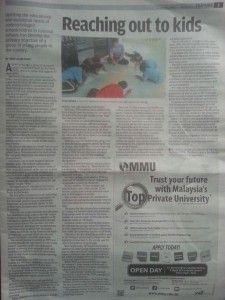Uplifting the educational and emotional needs of underprivileged schoolchildren in national schools has become the primary objective of a group of young people in the country.
ABOUT a year ago, a group of young volunteers established Teach for the Needs (TFTN), and as its name well suggests, its raison d’être.
The World Education Forum was held in Dakar, Senegal and 2,000 people subscribed to a goal that by 2015 “all children particularly girls, children in difficult circumstances and those belonging to ethnic minorities, have access to free and compulsory primary education of good quality”.
While access to basic primary education is not so much a problem in Malaysia, a growing cultural focused on extra tuition classes and costly supplementary books have created a tremendous performance gap between pupils from less fortunate backgrounds and their privileged classmates.
TFTN’s noble purpose is hence to provide an opportunity for primary school pupils, mostly those from less privileged households and orphanages, who are unable to afford commercial tuition like their peers.
The tuition classes, covering subjects ranging from Bahasa Malaysia, English, Mathematics and Science, are provided voluntarily by the young teachers to their pupils at their respective schools.
The classes take place in a small class of up to six pupils for about three hours in a week, after school hours. This eliminates the need to look for transport, classrooms and other logistical arrangements.
Volunteers can be both teachers and non-teachers alike. The teacher-ambassadors contribute by providing free tuition classes at their respective schools, while our non-teacher volunteers assist in providing strategic and administrative support to the organisation.
One might wonder why we chose to use “Needs” in our name instead of Teach For the “Needy” or just “Need”.
The organisation’s aspirations encompass three major premises, which explains the “s” in Teach for the Needs.
The first pillar is premised on the belief that there is a need to provide an opportunity for less fortunate pupils to get an educational experience, at least partially similar to that of their more fortunate peers from privileged households.
There are two major elements that the group has identified to help achieve the said “educational experience”. The first is cognitive or IQ (intelligence quotient) development through extra tuition classes. The second is EQ (emotional quotient) development via interactions and relationship-building with the pupils.
Often households facing financial and familial issues fail to provide these two relevant aspects in a child’s scholastic experience.
The second premise is looking at TFTN as a training ground and opportunity for the young teacher volunteers under the organisation banner to develop their pedagogic skills and confidence as well as to instil the benevolent spirit to help those in need, without expecting material returns.
This stems from our belief that one of the reasons for education inequality in Malaysia is the over-commercialisation of education.
Not only does this enlarge the growing lack of “emotional” input in the teaching profession as a social profession, it also essentially leaves behind pupils who cannot afford to pay for them.
Thirdly, the longer term and qualitative premise that the organisation aims to address is to challenge the stereotype amongst those in Malaysian society, which fail to see that children from less fortunate households too have potential.
These children are often labelled as trouble-makers, lazy and unworthy of attention.
However, TFTN believes these children may have actually been the product of oversight on the part of teachers and society, losing “hope” that they will make it.
Most of them are often left behind and lacking in terms of emotion, affection and basic physical needs, thereby impeding a wholesome educational experience. By getting the focus back to such pupils, those in authority and others will realise that these children too have the potential to be trained.
With this objective in mind, the group aims to provide flexible platform, geared by drivers of change, who would like to renew hopes for such children and the Malaysian education system. TFTN believes that there are many Malaysians who want to help contribute towards education empowerment, so let us be the platform!
A fitting quote by American cultural anthropologist Margaret Mead is: “Never doubt that a small group of thoughtful committed citizens can change the world; indeed, it’s the only thing that ever has.”
In a short period of five months, TFTN has attracted 74 volunteers who are helping the organisation achieve its objectives.
Of that number, 22 have strategic and administrative roles while another 20 are teacher-ambassadors on the field who volunteer at their respective schools.
Non-teacher volunteers are welcomed to participate through facilitating group exercises and extra-classroom teaching at these orphanages.
The group has also adopted two orphanages in Gopeng and Kuantan under our Expansion Programmes with 32 volunteers. The total number of students under TFTN’s care at the moment stands at 150 pupils.
Empirical studies have proven that successful volunteering emerges when the objectives provide opportunities for personal achievement and enable the volunteers to form social bonds.
Volunteers are also driven by incentives such as the feeling of achievement, recognition, the aspiration to give back to the society, and the urge to bring about social change.
Most importantly, TFTN aims to provide a platform for these young volunteers to participate in what we coin as “education activism”, where a common educational goal is strived for, while providing a sense of belonging in a structured, organisational setup.
When TFTN was announced to be “open for business”, these young teachers took to the challenge without hesitation and eagerly offered their free tuition service.
This undoubtedly exhibits the zeal and demand for a platform like TFTN amongst the new breed of educators.
These young volunteers, often speak with passion, of their respective experiences with the less fortunate pupils that they have encountered at least once in their teaching years.
The growing number in the teaching workforce in Malaysia has also helped this overwhelming response.
There are 250,000 primary and 300,000 secondary school teachers serving the educational needs of almost 5.4 million students from government schools. From these numbers, is it not surprising that TFTN has been able to attract its current pool of volunteers in just five months?
As a ready platform for education activism, the organisation aims to expand its volunteer base of teachers, with value propositions focusing on three focus groups. They are pupils, teacher-ambassadors and volunteers.
The first value proposition is to provide tuition, EQ support and organise continuous monitoring for the academic development of its focus group of pupils.
Our second value proposition is the complementary training curriculum for our teacher-ambassadors to supplement and enhance their teaching experiences.
This is not only to strengthen their peda-gogic skills, but also to guide them to professionally tailor their approaches to the organisation’s targeted group of children.
It is hoped that these young teachers would also be education reformers addressing existing problems in the education system throughout their long career.
The third value proposition is the availability of a stable funding base from philanthropic sources, as well as public fund raising for the organisation’s additional welfare programmes.
These are expected to be channelled to volunteers, who will primarily engage in the adoption of welfare houses, orphanages, and relevant initiatives.
Not only will this involve monetary and material donations, these volunteers are also expected to be able to ride on the TFTN platform to provide educational and motivational inputs to less fortunate children and orphans.
From the latest national poverty line study, 3.8% of households are designated as living with household incomes beneath the poverty line. This means that more than 100,000 primary school pupils are eligible for the programme, out of the three million pupils in Malaysia.
Therefore, there is vast opportunity still for a platform like TFTN to serve this group of pupils. As a mid-term target, the organisation aims to cater to 1,500 students, with a force of 300 ambassador-teachers, and five orphanages, by the end of 2017.
“Education is a companion which no future can depress, no crime can destroy, no enemy can alienate, and no nepotism can enslave.”— Ropo Oguntimehin
> The writer is the executive director of Teach For The Needs (TFTN). The above article is the first of a two-part series on the organisation.
 Anas Alam Faizli Magna Est Veritas Prae Velabit – The Truth is Mighty and will always Prevail!
Anas Alam Faizli Magna Est Veritas Prae Velabit – The Truth is Mighty and will always Prevail!






